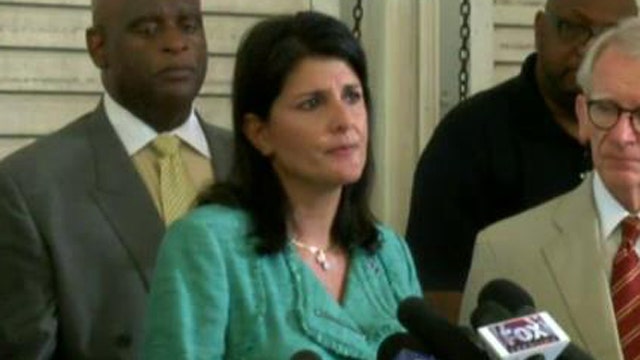Gov. Haley: The heart and soul of South Carolina was broken
South Carolina governor delivers emotional statement after Charleston church massacre
The gunman walked into the church sanctuary and opened fire.
He showed no mercy – firing more than 100 rounds and exploding a pipe bomb in the balcony. There was nowhere to hide from the carnage.
Click here to follow Todd on Facebook for conservative conversation!
Seven people died that night. Seven others were wounded.
It was Sept. 15, 1999 – the day a madman slaughtered Christians inside Wedgwood Baptist Church in Fort Worth, Texas.
That was the year Carl Chinn began compiling statistic documenting violent attacks on churches and synagogues and other houses of worship.
Since 1999, he has recorded more than 1,000 such attacks – more than 150 so far this year.
Chinn tells me the attack on the pastor and parishioners at Emanuel African Methodist Episcopal Church is the worst attack on an assembled congregation in American history.
“This was a calculated attack,” he said. “It’s just awful. I hurt for those people.”
And one of the nation’s foremost experts in church security fears the Charleston massacre could only be the beginning.
“Violence directed against the church has been growing over the past decade,” said Tim Miller, the president of LionHeart International Services Group. “My fear is what we saw in Charleston is one incident of many more to come.”
LionHart specializes in providing security consulting to churches.
“Church security really matters,” he told me. “Churches are becoming more and more a major target. Dealing with this is really important.”
Miller, a retired Marine, served nearly 30 years as a former Secret Service agent, police officer and counter-intelligence officer. His team includes former Homeland Security agents, FBI agents and special-ops personnel.
“I spent my life learning how to protect others,” he said. “About three years ago, I realized the same threats we experienced overseas are now here. And we needed to pivot and direct our efforts to help those in churches and non-profits.”
Miller said churches are soft targets and what happened in Charleston should be a wakeup call.
“My first thought was to pray,” he said. “Having been in situations where that kind of carnage exists – the suffering is unimaginable. My second thought – was this is a realization of what we’ve been talking about and what we help churches prepare for.”
The difficulty is making the church a welcoming place for hurting souls – while at the same time preparing to deal with those who might commit violence.
“We welcome you on the one hand – while on the other hand if a gunman comes in – we have the resources to handle it,” he said.
I do believe the Old Testament Book of Nehemiah addressed such an issue: “We prayed to our God and posted a guard.”









































